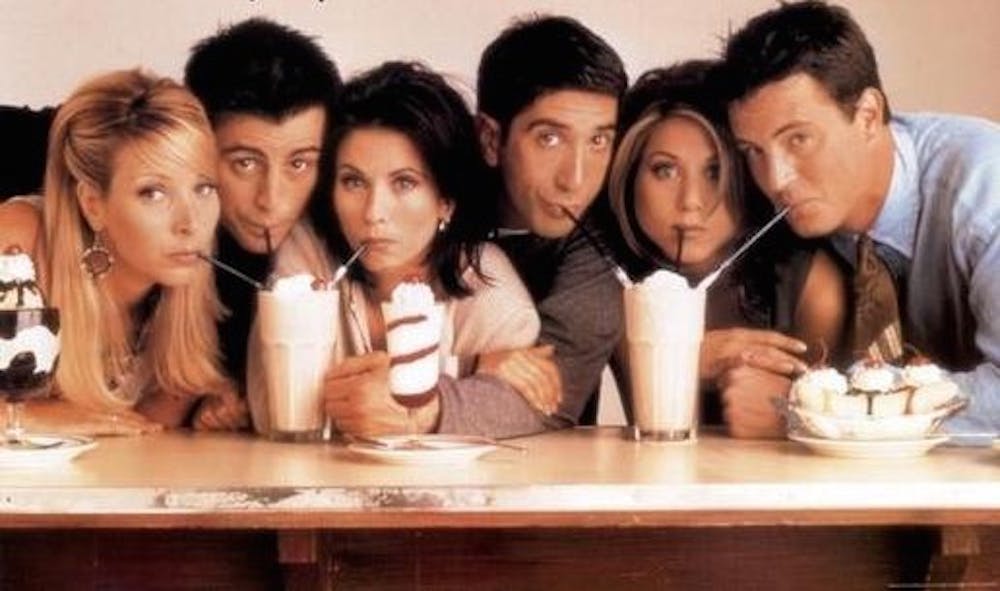There’s a soundtrack to my living room and it’s Friends. My roommates and I will drop everything (sometimes literally) when those four claps in the theme song come on, and we’ll clap along with it. If you’re a guest, it’s understood that you clap too.
Whether we’re just hanging out or studying or even ranting about that annoying thing that happened today, Friends just sort of plays in the background. During the ranting, something funny will happen on the show, and we’ll just let out a little laugh and continue talking, feeling marginally better about a terrible day.
Sometimes when I mention this to people, though, they’ll scoff and look down on me. They’ll say it’s a terrible show, that it’s trash. They’ll say that I shouldn’t be wasting my time with it, and I should watch something better.
Granted, from the perspective of a modern audience, Friends has its flaws. Ross doesn’t want his daughter to grow up with a male nanny. Monica’s weight is a punch line. Ross doesn’t want his son playing with a Barbie. Gay stereotypes are scattered throughout the show. The characters are all white.
I agree that these are flaws. But progress doesn’t happen all at once. Even shows like Modern Family that are considered the pinnacle of progressiveness could be seen as flawed 20 years from now.
Progress means changing and developing with time, which is why it’s unreasonable to judge Friends by holding it to the standards of today. For the ‘90s and early ‘00s, Friends was incredibly ahead of its time.
It was one of the first “mainstream” popular TV shows to actually show a lesbian wedding. Though Ross does have his flaws, he was the one who convinced his ex-wife, Carol, to screw society and get married to the woman she loved.
The pilot episode is centered on a woman walking away from a marriage and choosing to move to the city and discover who she is. Later, this same woman, Rachel, raises a baby while still unmarried. Rachel fights to be independent in her relationship with Ross and have interests and activities outside of the relationship.
Of course, there are more conservative characters who disagree with Rachel’s decisions. Ross and Monica’s mom never stops pushing for Monica to get married. Their dad talks about how women shouldn’t try to “have it all.”
But the fact that these ideas and conflicts exist in the plot doesn’t mean the show is bad. There really was a cultural taboo associated with two single parents raising a child and with women who wanted to “have it all.” What counts is that those ideas were addressed and talked about and even proved wrong on the show.
Monica does end up with the big job as a chef at the fancy New York restaurant, but she also gets married to Chandler and has kids. For a while, she’s the one supporting her family while Chandler is unemployed.
Ross’ ex-wife Carol’s relationship with Susan might be the most functional relationship on the show. They are committed and love each other, and they do an excellent job of raising their son Ben together. They are not a stereotype. They’re far from it. Susan even mocks most of the stereotypes.
Again, I do not believe in any way that Friends depicts lesbian relationships perfectly. But they gave it a shot, and for the ‘90s, they didn’t do a bad job. Friends had conversations about female sexuality at a time when you rarely got to see mainstream media exploring ideas like that.
Yes, Chandler’s transgender dad is a stereotype. Yes, no one ever refers to him with the right pronouns. Yes, Chandler’s mom even mocks him for wearing a dress. Yes, that’s wrong. But here’s the thing: Chandler goes back to Vegas and reconciles with his dad. We see a transgender character being accepted. It’s not complete, and it’s certainly not perfect, but it’s a step in the right direction.
Progress happens in small steps more than it does in giant waves, so don’t look down on the steps that got us to where we are today. Have conversations about the show’s flaws, but don’t judge the girl who’s had a terrible day and just wants to go home and watch Friends. Not only is it comfortable, it’s just undeniably funny.

















